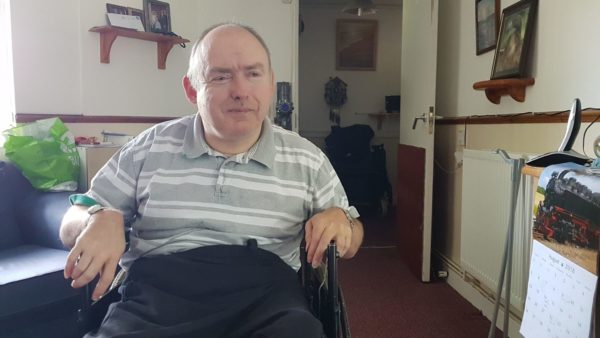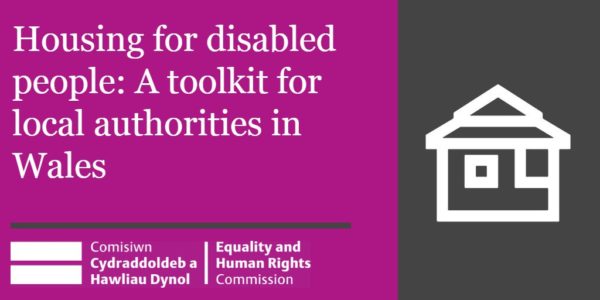What Accessible Housing Means To Me
To coincide with the release of ‘Housing for disabled people: A toolkit for local authorities in Wales‘, we take a look at the importance of accessible homes.
Mark Gibbons is an active member of the Melin Homes Disability Access Group and is enthusiastic about the need for accessibility for everyone.

We asked Mark what accessibility meant for him:
“I’ve been in my home for 27 years now and I’m very happy where I am. I’m a wheelchair user, and unfortunately when I moved in, the property was not well adapted for me. It was a different time, and there wasn’t the same level of knowledge then as there is now for these kind of things. However, over the years I have had adaptations which have made my life much easier. For example, the grab-rails in the bedroom are a very simple way to help me get in and out of bed.”
Having these adaptations was like unblocking a road.

“I was able to get my kitchen refitted as the surfaces, oven and cupboards were too high for me to use properly. Now they’ve all been lowered, and I can cook and prepare food for myself. Having these adaptations was like unblocking a road – if there’s a blockage, you can’t get through it. Now I’ve got a lot more freedom.”
We asked Mark what he thinks about the awareness of accessibility requirements and whether there is a need for more guidance such as the toolkit:
“To me, it’s very important that people’s needs are taken into account at the building stage. Everyone is different and has different needs, so you have to talk to them to find out what they are. If your home is properly accessible for you when you move in, it makes an immense difference and allows you to live independently straight away.”
“I think a lot of people generally haven’t got a clue about accessibility, they think if a toilet has a hand rail then it’s accessible, but there’s much more to it than that.”
Mark reflects on his involvement and stresses the importance of involving disabled people in the work of housing providers:
“I take part in the Disability Access Group with Melin, to help feed in information to make sure that new-builds are planned with disabled people in mind. I meet with other tenants every few weeks, and sometimes with staff who have something relevant to talk about. I feel like Melin really listen to us, and take our views on board for their new builds. I’m trying to be an active part of the group so I can be a voice for disabled residents. I want to push things forward so that i’ve done my bit and made things better.”
Mark also told us about the importance of embedding accessibility into housing standards and building regulations with some straightforward recommendations:
“I would like to see all houses made with wider corridors and doors for a start. You also have to look at kerbs, and drop kerbs around the houses too. Lots of places have ramps these days and that makes things easier. We’ve been to sites that have access by pressing a button and making sure they’re at the right height for wheelchair users. These are easy changes that don’t just benefit wheelchair users, but people with visual impairments and mothers with prams.”
Today has seen the launch of Housing for disabled people: a toolkit for local authorities in Wales / Tai ar gyfer pobl anabl: Pecyn cymorth ar gyfer awdurdodau lleol yng Nghymru.
 Through its Housing Inquiry, the Equality and Human Rights Commission has identified that there is a chronic shortage of accessible and adaptable housing, and projections are that this is set to increase.
Through its Housing Inquiry, the Equality and Human Rights Commission has identified that there is a chronic shortage of accessible and adaptable housing, and projections are that this is set to increase.
The aim of this Toolkit is to support Local Authority elected members to consider housing for disabled people in their strategies and plans, and promote meaningful involvement of disabled people in developing these, share best practice, and assist with scrutiny of local authority housing policies and practices. The toolkit can also be used by housing association boards.
Housing for Disabled People can also help disabled people and community organisations understand local authority obligations in relation to disability and housing and influence them.
Alicja Zalesinska, Director of Tai Pawb said:
26% of people in Wales are disabled and this number grows to a striking 39% for social housing tenants. By 2035, the number of over 65s with a mobility impairment is expected to go up by 58%.
Accessible housing is an essential requirement in facilitating independent living and the well-being of disabled and older people. Lack of accessible homes is having a profound and often devastating impacts on people’s lives, making the effects of housing crisis particularly acute for disabled and older people now.
We see this toolkit as one of the crucial tools in enabling a greater strategic focus on accessible housing in Wales to tackle the problems we’re facing now and to enable independent and fulfilled living for future generations. We are going to continue working with all partners and stakeholders to make this a reality in Wales.
There are a number of ways Tai Pawb can support you to work on improving your accessibility, such as training, support with EIAs, policy, strategy and practice reviews, and our helpline. Please get in touch with any queries as we may be able to work with you on a bespoke solution.
We have lots of information on accessible housing for our members on our Resources page.
Please also see our Good Practice Briefing on Accessible Housing (members only).